Religions for Peace Multi-Religious Humanitarian Fund Supports Internally Displaced Children and Families in Burkina Faso
“When a crisis breaks out, we spend so much time addressing the physical needs that arise, that we forget that people are hurting mentally and emotionally. This is especially so for our children whose specific needs are often overlooked in times of crisis. We want to create safe spaces for children to have the freedom to be kids, even in times of crises,” a youth leader for the Jeunesse Etudiante Catholique Internationale (JEC Burkina Faso) emphasised, as two young children hung from his arms, with the sound of children laughing and playing with one another in the background.
In 2022, the United Nations Children’s Fund (UNICEF) reported that Burkina Faso is “the epicenter of a multidimensional humanitarian crisis affecting the Sahel region, driven by a combination of factors including armed violence, insecurity spreading to coastal countries, demographic pressures, climate change, and health crises.” As key actors on the ground, the International Young Catholic Students (IYCS) bears witness to the suffering of millions of displaced families. IYCS reports, “The newly displaced have great difficulty in finding shelter in refugee camps, which leads to increased vulnerability to security threats and bad weather, particularly for women, children, and other vulnerable groups.” Moreover, the situation also impacts mental health and impedes the holistic development of children, as most of them are forced to abandon school due to distance and the lack of means and resources.
“We could see members of our communities hurting; and our hearts broke knowing they did not have anyone to turn to. We could not just stand by and do nothing,” one of the youth leaders of IYCS said as she drew a tree with a young boy. “So, when we heard that Religions for Peace would offer us support in turning these feelings into action, we rushed to send in an application [for the Multi-Religious Humanitarian Fund] to make this a reality.”
With support from Religions for Peace through its flagship Multi-Religious Humanitarian Fund (MRHF), IYCS mobilised the Humanitarian Support to Internally Displaced Peoples and Host Communities Affected by the Security Crisis project, in collaboration with JEC Burkina Faso and local Muslim, Catholic, Protestant, and Indigenous communities. The project was implemented in the town of Pabré and Diébougou to ease the suffering of internally displaced children and families, and to raise awareness on the added value of interreligious dialogue as “a key component of lasting peace.” Apart from the provision of food and medicine, the project aimed to create safe spaces for children to engage in trauma healing processes through art and sport. It also facilitated discussions on the importance of interreligious dialogue; counselling sessions with licensed psychologists; and an interreligious sports tournament aimed at fostering solidarity and social cohesion.
Through the project, 1,823 internally displaced peoples (IDPs) received food and basic supplies, and 733 essential medicines (anti-malaria, cough syrup, pain relief, cold, and antibiotics) were donated to a health centre in the area. Around 250 children and youth engaged in counselling services with psychologists, and over 500 young people participated in a sports tournament that cultivated fraternity and solidarity and raised awareness on the importance of interreligious dialogue.
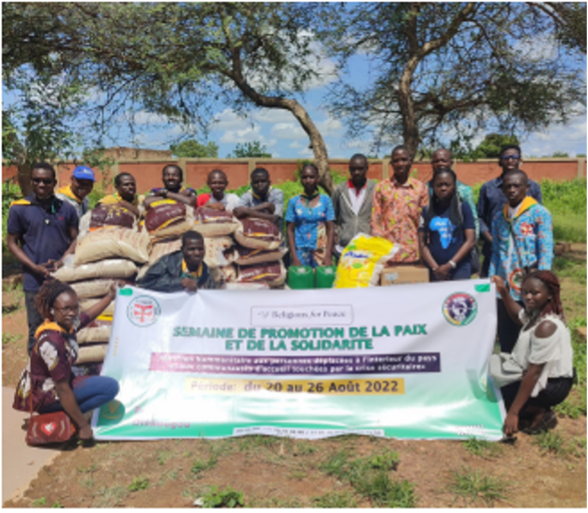
Access to food and medicine is fundamental for the physical, mental, and emotional well-being of people and families. It is with this understanding that IYCS and JEC Burkina Faso launched the project with the delivery of basic supplies like rice, oatmeal, tomato paste, oil, and soap, as well as essential medicines to IDPs. Lifesaving humanitarian relief was provided to over 300 IDPs on the first day of the project. In addition, board games were made available to allow children to play and relax, while the project facilitators held discussions with the families on the importance of interreligious dialogue as an integral element of peace and social cohesion.
When asked about the impact of the project on her family, Ms. Sawadogo Ramata said, “Your coming here has given me great joy. Indeed, every day I am in anguish because when we arrived it was misery. I came with my child without bringing anything else, neither clothes nor food. We are tired of the lack of water and appropriate accommodation. When it rains, we have to stay up until the morning. We are also exposed to diseases like malaria. But with your support, we are happy now.”
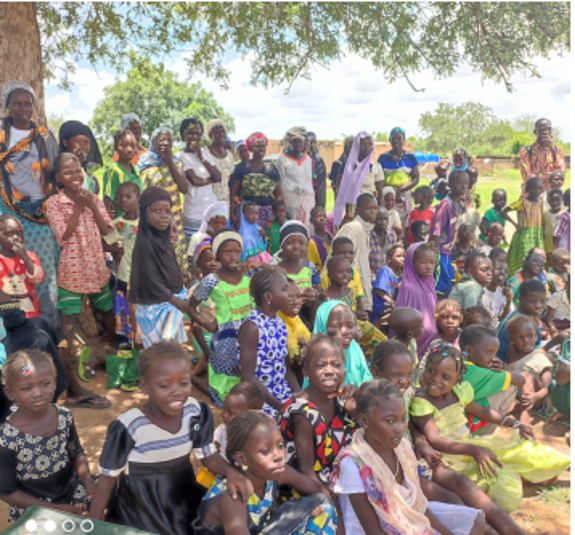
Working to provide humanitarian relief beyond basic necessities for survival, IYCS and JEC Burkina Faso also facilitated safe spaces to allow internally displaced families and children to express themselves and engage in trauma healing processes through art. Guided by the IYCS Psychosocial Conflict Analysis tool, adults and children were split into separate groups to be given the chance to talk through their emotions and express their feelings through art workshops, singing, and friendly dance competitions. At the end of the programme, the participants expressed their desire to continue engaging in psychosocial support activities to better manage their physical and mental well-being.
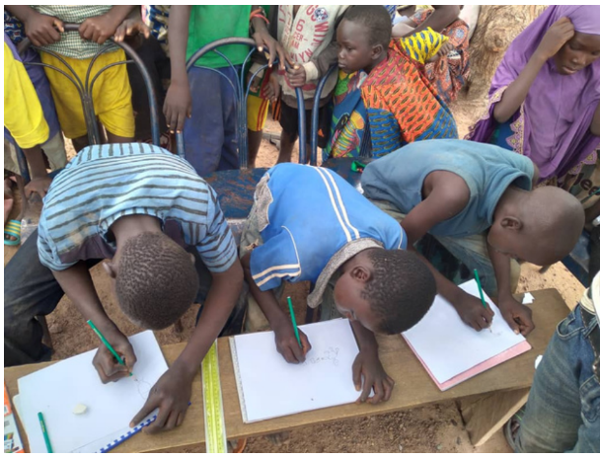
With the closure of about 6,000 schools, children and youth have lost the key institution designed to be conducive not only for their learning, but also for opportunities to build friendships and play with each other in a safe and structured environment. To this end, IYCS and JEC Burkina Faso also held drawing workshops to allow children to express themselves through creative ways that also cultivate creativity and friendships.
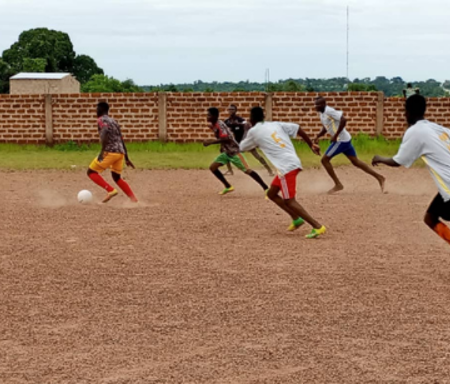
Furthermore, the project facilitated a sports tournament aimed at building fraternity and solidarity among the youth. Teams of Muslim, Catholic, Protestant Christian, and Indigenous youth gathered to participate in this tournament and play with one another. Before each match, the project facilitators held conversations with over 500 young participants on the values of peace, tolerance, and brotherhood between young people of different religions.
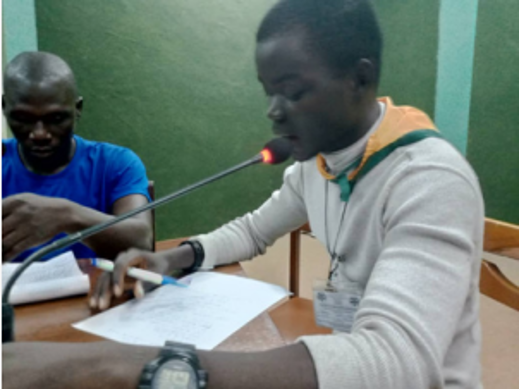
Youth participants led a radio programme where they shared the impact of the project and raised awareness on the importance of interreligious dialogue. The radio programme was hosted by Radio Unitas, a community radio station with an ecumenical approach that integrates Muslim and Protestant programmes. The programme was aired in the local language (Dagara), along with a panel discussion and a calling/messaging platform to engage with the larger community of Diébougou on the importance of interreligious dialogue in fostering unity among youth and communities from different backgrounds and religions.
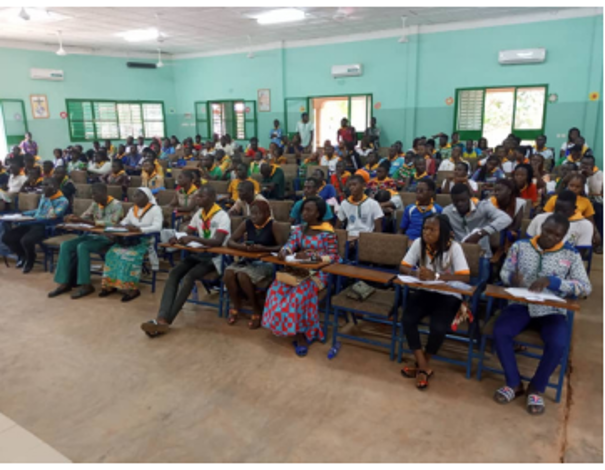
Lastly, IYCS and JEC Burkina Faso organised an interreligious panel discussion that brought together local faith leaders and youth under the theme, “Prevention and Peaceful Management of Conflicts: The Place of Interreligious Collaboration.” Bearing witness to the value added of interreligious dialogue in the context of humanitarian emergencies, the young participants advocated for the continued facilitation of interreligious activities to strengthen solidarity among youth; awareness-raising on interreligious dialogue and psychosocial support resources through art workshops and sports activities; and increased engagement of youth as key stakeholders in addressing the humanitarian crisis that the country continues to face.
When asked about the impact of the project on their community, Confe Boureima (a representative for the IDP population in the area) said, “We thank God and you for everything you do for us. We are very happy because you have put a smile on the faces of all the people living in this camp. We have not yet received any help from the government since we have been here, but you all stepped in to help us. We also thank you for the gifts that the children have received.”
Religious communities are often the first responders to local crises, and interfaith initiatives of organisations like IYCS have a lasting impact on their communities, particularly the vulnerable populations they serve. Through our flagship Multi-Religious Humanitarian Fund, we continue to support interfaith initiatives that deliver lifesaving humanitarian relief where the needs are greatest. We ask that you consider giving a gift today, so that we can continue to support interfaith initiatives that ease the suffering of the most vulnerable communities.